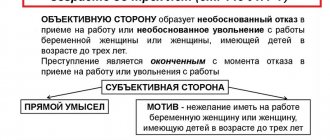Family law can rightfully be considered an important branch of the legal system in the state, aimed at regulating relations in society, creating a family or ending a marriage or divorce process.
The law is developed to strengthen family relationships, build relationships on love, mutual understanding, and also, according to the law, to regulate personal property and non-property relations between partners who have entered into or terminated a marriage, their obligations for alimony payments. On the basis of the law, freedom of choice is excluded; the sphere of family relations is built on clearly defined rules for building relationships between children and parents.
Marriage and family relations are regulated by the legislation of our country, according to which:
- a woman and a man can enter into a marriage union on a voluntary basis, as well as dissolve it;
- between spouses in the family there is only equality;
- couples have the right to resolve internal issues by mutual agreement;
- take care of children together , while having equal priorities;
- stand up for the protection of the rights and interests of children under the age of majority, defend them in court;
- When getting married , racial, national, social, linguistic, religious affiliation does not matter much.
The subjects of family law also include all family members and blood relatives. In addition to spouses, the family includes: grandparents, parents, brothers, sisters, trustees, guardians, adoptive parents, stepmothers and stepfathers.
Citizens are endowed with similar rights from their birth, but changes in rights are possible with age, for example, if they reach the age of majority, the legal capacity of individuals is limited, or if relatives have mental or hereditary diseases. Certain categories of citizens still have some restrictions according to family law, perhaps restrictions on guardianship and marriage.
What are the features of relationships regulated by family law?
The relationship is special because:
- purely personal;
- there are no restrictions on their duration;
- they cannot be alienated, transferred on the basis of succession, or even by agreement of the parties;
- gratuitous;
- are imperative.
Sanctions of a property or non-property nature may be imposed on family relationships in the form of penalties and losses inflicted on the state.
Family relations in a family cannot be called purely property-related, they cannot be measured, they are based on feelings and physical needs of a person. Families have the right to inherit property, and inheritance and donation of property are carried out free of charge.
The Family Code states that dispositive norms have now been increased, and the very method of regulating family rights has changed. Married persons are allowed to draw up prenuptial agreements and stipulate conditions for alimony in the event of a divorce.
Family law does not provide for age restrictions for marriage. Entry is permitted from the age of 18, and it is not prohibited by law even at the age of 60-70, which was completely illegal even before the revolution. Marriage with elderly people was considered deliberately false, with the intent of a property nature.
Family law is an independent branch, which is almost impossible to separate from civil law.
Regulations on family law
The peculiarity of normative acts of ministries and departments is that they must be registered with the Ministry of Justice of the Russian Federation, and also officially published in the Rossiyskaya Gazeta. The deadline for official publication is 10 days from the date of their registration. This rule regarding departmental regulations was established by the President of the Russian Federation in 1993 (Decree No. 104).
Judicial power and sources of family law. Who sets family law? Article 126 of the country’s Basic Law states that, by virtue of its competence, the RF Armed Forces can give explanations on issues of family practice. The practical application of family law norms with clarifications from the highest judicial body becomes justified and correct.
Judicial practice is not included in the sources of family law. An opinion is given in favor of this: the clarifications of the RF Armed Forces are an interpretation of the norms, but do not establish new provisions; the subject of the interpretation cannot be considered a legislator. Considering the fact that the Supreme Court is engaged in studying, generalizing, and analyzing the judicial practice of lower-level courts, the highest court, on this basis, is developing a universal and unique approach to resolving similar court cases in the future. On this basis, the attitude of specialists to the practice of courts and to the possibility of applying it as a source of law has changed over time. Some theories of law establish that the sources of family law should include the Resolutions of the Supreme Court of the Russian Federation. For example, issues of paternity and child support obligations (1996, No. 9), issues of adoption (1997, No. 7), etc.
Social relations regulated by family law
Family relationships partly become social upon marriage. As a rule, at first the relationship is of a non-property nature, the creation and construction of a family on love, mutual sympathy, respect, affection, and joint trust in each other. Couples have freedom and the right to choose. Non-property relations are a priority, although in many families today marriage is arranged according to convenience, property relations take precedence.
Living together, common housekeeping, and child support give rise to property relations; all types of relations become interconnected.
A person lives in a society, so he cannot escape social relations; a citizen is obliged to monitor moral norms, behavior in society, customs, adhere to the canons of his religion, family law.
Without public intervention, marriage, the birth of children, adoption, and guardianship are impossible. Society can influence family relationships, the connection of ties cannot be secret, however, the rights and interests of the family are protected by law. Each family member has the right to protect their interests in court; there are no restrictions by law; all family members are endowed with the same rights and responsibilities. Other relatives have certain limits, regulated and established by family law.
Property relations regulated by family law
Family law regulates the relationship of husband and wife to parents, children, adopted children, adoptive parents, and orphans.
Before the adoption of the law, relations were not regulated by family law, except for alimony obligations, civil law dealt with the settlement of relations. Only the revised Family Code of 1995 gives the right to intervene and establish certain restrictions, limits, that is, to deprive parental rights to children in case of failure to fulfill their direct duties, cruel treatment of their own and adopted children. Also, relationships become dependent, for example, on the guardianship and trusteeship authorities, when taking someone else’s child into the family for upbringing.
Legislation cannot regulate all relations of a property and non-property nature; property relations depend on the material criterion, but it is almost impossible to separate these relations between parents and children. Another thing is the rules of law regulating relations.
Does family law regulate personal non-property relations?
Personal non-property relations are regulated by civil, not family law.
Relationships related to:
- the results of creative ideas, scientific works;
- various kinds of inventions;
- creation of scientific and literary works.
The nature of objects is immaterial; they are based on ideas, images, symbols, that is, the thoughts of the creator. Today, any non-property object can be used as a commodity, that is, sold, converted into property relations between people.
The property side is a derivative of the non-property side, all relations are interconnected, and therefore require civil legal regulation, or registration.
A person has the right to the benefits of civilization: health, personal family secrets, business reputation, privacy. Benefits cannot cease, be taken away, or be transferred; civil law stands for the protection of intangible human benefits, protects the honor and dignity of its citizens. If the rights of interests are violated, a person has the right to go to court and can also claim compensation for material and moral damage.
Basic principles of family law
Family legislation is a system of regulations.
Among other things, consistency is ensured by the unity of
the principles
of legal regulation of family relations, which are enshrined in Art. 1 RF IC.
The basic principles of family law, or, what is the same, the principles of family law, represent certain guiding ideas in accordance with which the legal regulation of family relations is carried out.
The norms defining the principles of legal regulation of family relations are the basis of all other family law norms. All norms of family law are subject to the basic principles set out in Art. 1 RF IC. They must be taken into account when understanding the content of all the rules formulated in this Code, when interpreting family law norms, applying civil law to family relations, applying family law and civil law to family relations by analogy, etc. and so on.
Many scientists have turned to identifying the system of principles of family law and analyzing their content. So, A.I. Parchment in 1951 named such principles of (Soviet) family law as complete equality of men and women in personal and property rights arising from marriage and kinship; protection of motherhood and childhood; exercise of parental rights solely in the interests of children; monogamy <1>.
———————————
<1> See: Soviet civil law. T. II / Ed. S.N. Bratusya. M., 1951. S. 366 - 367.
The principles of family law were outlined in approximately the same way by G.M. Sverdlov in 1958. In addition to those mentioned, he also highlighted such principles as equality of citizens regardless of nationality and race; freedom of family law from the influence of any religious rules; comprehensive protection of parental rights <1>.
———————————
<1> See: Sverdlov G.M. Soviet family law. M., 1958. S. 38 - 45.
In 1982 V.F. Yakovlev named the following principles of family law: equality of citizens in family relationships; equality of men and women; monogamy (monogamy); freedom and voluntariness in marriage; freedom of divorce under state control; state care for the mother and child, full protection of their interests, encouragement of motherhood; mutual freedom of family members, moral and material support for each other <1>.
———————————
<1> See: Soviet family law: Textbook / Ed. V.A. Ryasentseva. pp. 16 - 20.
In 1985 G.K. Matveev recognized the main principles (principles) of the legal regulation of marriage and family relations as freedom of marriage, freedom of divorce, the legality of only civil secular marriage, monogamy, equality of spouses and full protection of the interests of children <1>.
———————————
<1> See: Matveev G.K. Soviet family law: Textbook. M., 1985. S. 20 - 22.
Appeal to the indicated (and similar) points of view expressed in different periods of the history of the Russian state, differing in the socio-political situation, seems justified, moreover, necessary. It is impossible to consider the basic principles (principles) of family law and family legislation in isolation from what happened before. Our modern legislation has been freed from the ideological layers necessary in those days. But it seems that today’s family legislation is the result of the development of Russian, Soviet, Russian family law.
As a kind of introduction, a presentation of the basic principles of family law precedes the reproduction of constitutional provisions in a slightly modified form. Firstly, in accordance with Part 1 of Art. 38 of the Constitution of the Russian Federation, motherhood and childhood, the family are under the protection of the state. Secondly, by virtue of Part 2 of Art. 7 of the Constitution of the Russian Federation in the Russian Federation provides state support for family, motherhood, paternity and childhood. In these cases, support and protection are spoken of in the broadest sense. This refers to a set of measures of an economic (including financial), organizational, and legal nature. Legal measures are enshrined in legislation of various sectoral nature (civil, labor, housing, healthcare, etc.).
Among the main principles of family law are:
1) the need to strengthen the family
;
2) inadmissibility of arbitrary interference of anyone in family affairs
;
3) ensuring the unhindered exercise by family members of their rights
;
4) ensuring the possibility of judicial protection of family rights
;
5) voluntary marriage between a man and a woman
;
6) recognition of civil secular marriage only
;
7) equality of rights of spouses in the family
;
 priority of family education of children
priority of family education of children
;
9) ensuring priority protection of the rights and interests of minors and disabled family members
;
10) the inadmissibility of restricting the rights of citizens upon marriage and in family relationships on the basis of social, racial, national, linguistic or religious affiliation
<1>.
———————————
<1> Unfortunately, the form for presenting the basic principles of family law lacks proper clarity. Probably for this reason, there is no unity in the legal literature when deciding which provisions of Art. 1 of the RF IC are the main principles and, accordingly, the number of such principles (see, for example: Pchelintseva L.M. Decree. Op. pp. 20 - 25; Nechaeva A.M. Family law: A course of lectures. M., 2000 pp. 26 - 35; Civil law: Textbook. In 3 volumes. T. 3 / Edited by A.P. Sergeev, Yu.K. Tolstoy. pp. 310 - 315).
At first glance, one of the main principles of family legislation should also include the need to build family relationships on feelings of mutual love and respect, mutual assistance and responsibility to the family of all its members (Clause 1, Article 1 of the Family Code). In addition, the resolution of intrafamily issues by mutual agreement is indicated as one of the main principles.
I think G.F. is right. Shershenevich, who wrote: “Family rights should not include the rights established by law to mutual love, respect, respect, because these are imaginary rights, devoid of sanctions - law deals only with the external world, but not with the spiritual” <1> . Therefore, one should hardly agree with the statement that the legal regulation of family relations “can be structured in such a way that it contributes to the formation and preservation of mutual love and respect between family members, responsibility to the family and the desire of family members to provide mutual assistance and support to each other” <2> .
———————————
<1> Shershenevich G.F. Decree. op. P. 407.
<2> Civil law: Textbook. In 3 vols. T. 3 / Ed. A.P. Sergeeva, Yu.K. Tolstoy. P. 311.
The inclusion of the provisions under consideration in the law probably cannot be assessed negatively; perhaps, it should even be welcomed. But at the same time, we must be aware that it has never been possible to “translate into legal language” such concepts as love and respect (in the family) and is unlikely to ever succeed.
So, V.I. Sinaisky wrote: “Natural and moral relations only underlie the legal relations of family members. Therefore, when interpreting the norms of family law, it is necessary to strive to give the norms legal significance, and not limit ourselves to stating their moral nature” <1>.
———————————
<1> Sinaisky V.I. Decree. op. P. 485.
It is impossible to force the fulfillment in kind of an obligation to love and respect other family members, just as it is impossible to enforce this obligation with sanctions or create (invent) duties (and corresponding rights), the fulfillment (realization) of which will lead to the goal - mutual love and respect. In practice, in this case we are dealing with an appeal devoid of legal content.
As for the mention of mutual assistance, here too the law is powerless. Being “built in” into legal matter, the requirement for the need for mutual assistance is transformed, taking the form of an obligation for some family members to support others.
Finally, the phrase “responsibility to the family of all its members” is not used in a legal sense. Apparently, in this case responsibility is spoken of from a social point of view. Firstly, remaining on a legal position, it should be assumed that liability occurs in the presence of certain illegal actions. Secondly, bringing to responsibility involves the application of sanctions. Thirdly, no matter how much science says that the family is a subject of law or the need to recognize the family as a subject of law <1>, the law does not consider the family a participant in legal relations. Relationships between family members are regulated, etc.
———————————
<1> See, for example: Krasavchikov O.A. Fundamentals of housing legislation: subject of regulation and legal nature // Fundamentals of Soviet housing legislation. Sverdlovsk, 1981. S. 18 - 19; Korolev Yu.A. Family as a subject of law // Journal of Russian Law. 2000. N 10. P. 61 - 66.
Among the principles of family law in paragraph 3 of Art. 1 of the RF IC mentions the resolution of intra-family issues by mutual agreement. It seems that this is also just a wish. Apparently, it should be stated that we are talking about an ideal to which we must strive, realizing its unattainability. And from a legal point of view, it is simply impossible to ensure the triumph of mutual consent. Of course, it is possible to make it the duty of all family members to resolve certain types of issues (and give a list of them) only by “unanimity.” But, firstly, wouldn't this be arbitrary interference in family affairs? Doesn't this contradict the essence of family relationships? Will it lead to a number of decisions simply being impossible to make due to disagreements between family members or the reluctance of any family member to participate in the decision? Secondly, the law does not and cannot have the means that could ensure the implementation of this kind of norms.
To strengthen the family
A very large number of family law norms have been introduced. Even the regulation of relations preceding marriage, among other things, has the goal of helping to strengthen the future family (Articles 11 - 15 of the Family Code). When considering a divorce case in the absence of the consent of one of the spouses to dissolve the marriage, the court has the right to take measures to reconcile the spouses and postpone the proceedings, assigning the spouses a period for reconciliation (clause 2 of Article 22 of the Family Code). Divorce in court is carried out if the court determines that further life together of the spouses and preservation of the family is impossible (Clause 1 of Article 22 of the Family Code). The court cannot recognize a marriage as fictitious if the persons who registered such a marriage actually created a family before the court considered the case (clause 3 of Article 29 of the Family Code). Parents can be deprived of parental rights only in the presence of emergency circumstances specified in the law, and in the manner established by law (Articles 69, 70 of the Family Code), etc. and so on.
It should be noted that the norms of other branches of legislation (for example, housing legislation) are also intended to contribute to strengthening the family.
Arbitrary interference is unacceptable
anyone in family matters. This means that family members are free to make any decisions affecting the interests of the family. No one has the right to “dictate” their will to family members or interfere in family affairs in any other way (for example, the parents of one of the spouses, providing financial support to the family, try to impose a lifestyle they like).
At the same time, when considering the content of this principle, it is important to pay attention to the fact that only arbitrary interference is unacceptable. In some cases, the law allows interference in family affairs. There are many such cases. This applies to divorce, raising children, etc. Most often, the law allows the court, the guardianship and trusteeship authority, and the prosecutor to intervene in family affairs. Sometimes other persons also have this right. Thus, officials of organizations and citizens who become aware of a threat to the life or health of a child, a violation of his rights and legitimate interests, are obliged to report this to the guardianship and trusteeship authority (Clause 3 of Article 56 of the Family Code).
The legal admission of cases of interference in family affairs is dictated by the desire to ensure the interests of a “weak” participant in family relations (for example, a minor citizen) or to prevent deviations from the basic provisions of state family policy, etc.
Law in general (including family law) should strive to ensure the possibility of unimpeded exercise of subjective rights
. In the relevant part of Art. 1 of the RF IC essentially reproduces the general legal principle. His triumph is evidence of the triumph of law. To achieve it, legal norms provide for measures to ensure the unhindered exercise of subjective rights, including establishing the procedure for the implementation of rights, defining procedures (forms, etc.) for the exercise of rights, indicating mechanisms for forcing obligated persons to fulfill their duties, naming sanctions applied to violators of rights , etc.
The rights and freedoms of man and citizen are ensured by justice (Article 18 of the Constitution of the Russian Federation). Protection of family rights is carried out by the court
, and in cases provided for by the Family Code - by state bodies or guardianship and trusteeship authorities. Actions of state bodies and guardianship and trusteeship bodies can be appealed in court.
For marriage
mutual
voluntary consent
of a man and a woman is necessary (clause 1 of article 12 of the IC). Forced marriage is unacceptable. And it doesn’t matter from whom the pressure comes and based on what considerations it is carried out, whether it is applied to one or both subjects, what form the coercion takes (threat, violence, etc.), etc. In any case, consent to marriage must be voluntary. If this requirement is violated, the marriage is declared invalid (Article 27 of the Family Code).
Marriage is registered with the civil registry office
(hereinafter referred to as the registry office). The rights and obligations of spouses arise from the date of state registration of marriage in the civil registry office (Article 10 of the Family Code). Thus, we can state the existence of the postulate: no registration - no marriage. It is impossible to replace state registration with any other act. Church marriage is not recognized by law. In the absence of state registration of marriage, the rights and obligations of spouses provided for by law do not arise. In everyday life, a civil marriage is often called the union of a man and a woman living together without registering a marriage (lawyers usually call such citizens cohabitants). This terminology seems unacceptable. The fact is that the very concept of “civil marriage” appeared when church marriage dominated. And if people lived together without performing the corresponding church rite, they were said to be in a civil marriage. Today, the law associates legal consequences only with a marriage registered in the registry office. From this point of view, marriages other than civil (i.e. registered) marriages do not exist at all. Sometimes persons living together without registering a marriage are called “actual spouses.” Following this logic, we can talk about “legal spouses” (those in a registered marriage). But there is no unregistered marriage. You cannot become a spouse (“actual”, “legal”) if the marriage is not registered.
Talking about spousal equality
As one of the principles of family law, the following circumstances must be kept in mind.
Firstly, equality is sometimes understood as equal rights, i.e. subjects have the same rights (in content and scope).
Secondly, in civil law, equality of subjects is understood as the absence of power and subordination, i.e. one subject cannot command another.
It appears that family law speaks of equality between spouses in both senses of the word. The rights of personal power of a husband over his wife (as well as parents over children, guardians over their wards) have long disappeared.
———————————
<1> See, for example: Shershenevich G.F. Decree. op. P. 407.
Husband and wife are equal in the sense that they are not subordinate to each other; one spouse cannot command the other.
Issues of family life are resolved by the spouses jointly and based on the principle of equality of spouses (clause 2 of Article 31 of the Family Code): spouses are equal in rights (and responsibilities) - equal.
The principle of equality of spouses is embodied in a number of articles of the Family Code (Articles 31 - 39, etc.).
As a general rule, it is family education
ensures the health, physical, mental, spiritual and moral development of children. Therefore, it is natural that one of the principles of family law is the priority of family education of children. This principle is specified in a number of articles of the Family Code (see, in particular, Articles 54, 55, 63, 121 - 123).
The need for priority protection of rights and interests
of minors and disabled family members is due to the fact that these persons are usually the “weakest” participants in family relationships. These individuals usually have a more difficult time “standing up for themselves” than other family members. They are the most vulnerable.
Among the “sources” of the principle under consideration should also be included the Universal Declaration of Human Rights, adopted by the UN on December 10, 1948 (here for the first time children were declared objects of special protection and care), the Declaration of Social and Legal Principles concerning the Protection and Welfare of Children, Particularly in Transfer children for upbringing and their adoption at the national and international levels of December 3, 1986 (UN), the Convention on the Rights of the Child of November 20, 1989 (UN), the European Convention on the Exercise of Children's Rights of January 25, 1996 (Council of Europe ).
In order to implement this principle, a number of norms are established in the Family Code. Thus, ensuring the interests of children should be the main concern of their parents. Parents have no right to harm the physical and mental health of their children. Methods of raising children must exclude neglectful, cruel, rude, degrading treatment, insults or exploitation of children (Article 65). Parents may be deprived of parental rights (Articles 69 - 70). But deprivation of parental rights does not relieve parents from the obligation to support their child (clause 2 of Article 71), etc. and so on.
Parents are obliged to support their disabled minor children who need help (Article 85). Able-bodied adult children are obliged to support their disabled parents in need of help (Article 87). A disabled spouse in need has the right to demand alimony from the other spouse who has the necessary means for this (Article 89), etc. and so on.
In accordance with Part 2 of Art. 19 of the Constitution of the Russian Federation, the state guarantees equality of rights and freedoms of man and citizen
regardless of gender, race, nationality, language, origin, property and official status, place of residence, attitude to religion, beliefs, membership of public associations, as well as other circumstances. Any form of restriction of the rights of citizens on the basis of social, racial, national, linguistic or religious affiliation is prohibited.
Accordingly, family law prohibits any form of restriction of the rights of citizens upon marriage and in family relationships on the basis of social, racial, national, linguistic and religious affiliation (clause 4 of article 1 of the Family Code).
The rights of citizens in the family can be limited only on the basis of federal law and only to the extent necessary in order to protect the morals, health, rights and legitimate interests of other family members and other citizens (clause 4 of article 1 of the Family Code). The “origins” of this rule are found in Part 3 of Art. 55 of the Constitution of the Russian Federation.
Source: Textbook "FAMILY LAW" edited by P.V. KRASHENINNIKOVA. Authors: Gongalo B.M., Krasheninnikov P.V., Mikheeva L.Yu., Ruzakova O.A.
Rules of law governing family relations
The rules of law are regulated by law; they are based on principles leading to only one equality of relations between spouses.
- Each family member cannot violate the rights of other members , and other family members cannot deprive their blood relatives of freedom without reason.
- Rights are protected by law and protected by court.
- For citizens who have entered into a marriage, or who have decided to terminate it or invalidate it, a procedure has been established.
- property and non-property relations .
- Adopted children are also family members; guardianship and trusteeship are allowed in our country, but only under the control of government agencies.
- There is a mutual relationship between the state and the family. The procedure in connection with the birth of children, marriage, divorce, adoption, registration of guardianship passes through the registry office, which means it becomes dependent on society. The rights and obligations of all family members are provided for and protected by law, and their right to freedom, legitimate interests, and strangers have no right to encroach without reason or interfere with the family.
The rules of law are known; they can be divided according to the following principles:
- all citizens have equal rights based on their ethnicity, regardless of rituals or race;
- spouses have equal rights and responsibilities;
- polygamy is excluded and does not comply with the law;
- citizens can voluntarily enter into marriage and also dissolve it;
- all family members are obliged to show moral and material care for each other;
- the state guarantees assistance and support in case of arbitrariness or groundless interference in the life of the family;
- each family member has the right to speak and defend himself in court , can declare and defend his legal rights;
- Limiting parents' rights is possible only on the basis of the law , by court; lynching is unacceptable.
Family law protects and takes into account the interests of children; their opinion is a priority for legislative bodies in the event of disputes between parents. Whatever the relationships in the family, they are all predetermined by law. In addition to rights, every citizen of the country is endowed with responsibilities, the observance of which is necessary for establishing contacts with the law, government agencies, living his life according to his conscience and, of course, with justice.
What goals does the legislator pursue when regulating family legal relations?
Family legislation and other acts containing norms of family law pursue the following goals:
- family strengthening;
- inadmissibility of interference in family affairs.
Marriage, as a legal fact, gives rise to legal consequences leading to the emergence of legal relations between the parties specified in the laws.
The family is under state protection and needs guarantees.
Some legal experts consider the position that moral and ethical guidelines are considered the principles of family law as a controversial issue. This is the existence of the institution of family on mutual love, sympathy, mutual assistance. However, it cannot be denied that these principles significantly influence the creation of an atmosphere in the family, and also run as a “red thread” through many provisions of the Family Code.
Rights and responsibilities of spouses
The rights and obligations of spouses are closely interrelated and can be divided into two large groups: personal and alimony.
The basic personal rights of spouses include equality in the family and the right to choose a surname.
In accordance with Art. 31 of the Family Code, each spouse is free to choose his or her occupation, profession, place of stay and residence. Issues of motherhood, paternity, upbringing, education of children and other issues of family life are resolved by spouses jointly based on the principle of equality of spouses. Spouses are obliged to build their family relationships on the basis of mutual respect and mutual assistance, promote the well-being and strengthening of the family, and take care of the well-being and development of their children.
At the time of marriage, spouses, at their own discretion, choose the surname of one of them as a common surname, or each spouse retains their premarital surname, or, unless otherwise provided by the laws of the constituent entities of the Russian Federation, adds the surname of the other spouse to their surname (with a hyphen), as a result which makes the surname double (two words). The combination of surnames is not allowed if the premarital surname of at least one of the spouses is double. A change of surname by one of the spouses does not entail a change of surname of the other spouse. In the event of divorce, spouses have the right to retain their common surname or restore their premarital surnames (Article 32 of the Family Code).
In addition, persons entering into marriage, as well as spouses, have the right to enter into a prenuptial agreement, that is, an agreement defining the rights and obligations of the spouses in the marriage and (or) in the event of its dissolution.
Alimony rights and obligations of spouses are provided for in Chapter 14 of the Family Code. According to Art. 89 of the Family Code, spouses are obliged to financially support each other. In the event of refusal of such support and the absence of an agreement between the spouses on the payment of alimony, the following have the right to demand the provision of alimony in court from the other spouse who has the necessary means for this:
- disabled needy spouse;
- wife during pregnancy and for three years from the date of birth of a common child;
- a needy spouse caring for a common disabled child until the child reaches the age of eighteen or a common disabled child from childhood of group I.
In accordance with Art. 90 of the Family Code, the right to demand the provision of alimony in court from a former spouse who has the necessary means for this, has:
- ex-wife during pregnancy and within three years from the date of birth of their common child;
- a needy ex-spouse caring for a common disabled child until the child reaches the age of eighteen or a common disabled child from childhood of group I;
- a disabled, needy ex-spouse who became disabled before the dissolution of the marriage or within a year from the date of dissolution of the marriage;
- a needy spouse who has reached retirement age no later than five years from the date of divorce, if the spouses have been married for a long time. The IC does not determine the duration of a long-term marriage.








